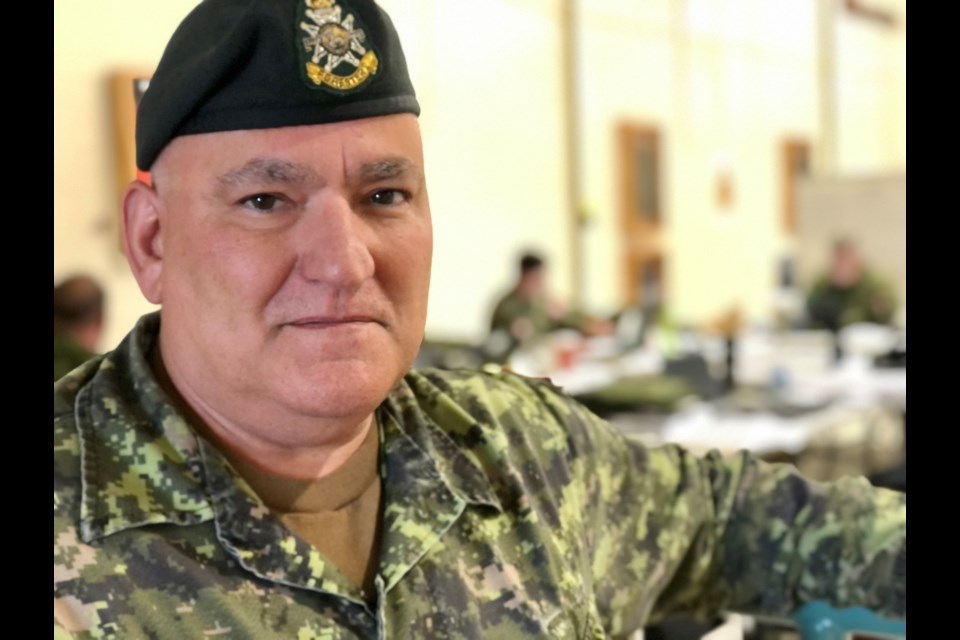With equipment spread orderly across the gym-like Dyte Hall and exercises taking place elsewhere on CFB Borden, approximated 200 mostly reservists were busy preparing this weekend for a mission to Canada’s north next month.
The troops gathered at the southern area of the local base in preparation for what the Canadian Armed Forces describes as a major two-week operation in August in and around Cambridge Bay and Pond Inlet, Nunavut.
Spread across the hall are toboggans filled with the necessities of life for 10 people, tents which troops have learned to assemble in seven minutes, and even a parachute slung out on the floor to be used for equipment drops.
Maj. Mike Lacroix, of the Barrie-based Grey and Simcoe Foresters, is commanding the Arctic Response Company Group.
Lacroix, who has been living in Barrie since the 2003 blackout, is a constable with York Regional Police during work hours and for the past 33 years has been a member of the Canadian Forces reserves in his off time.
He’s heading up the land task force for the Canadian Army in the joint surveillance mission which also includes Royal Canadian Navy ships and aircraft from the Royal Canadian Air Force involving more than 200 reservists.
Operation Nanook, according to the Canadian Armed Forces, is “designed to exercise the defence of Canada and to secure our northern regions” with a later phase following next winter.
It aims to assert Canada’s presence in the area and the role of reservists, said Lacroix, is to observe the activity there.
“This is a presence mission. Our role is to be visible in the community, to be visible on the shoreline,” explained Lacroix. “We’re there to observe and to see who is using the Northwest Passage, whether they’re using it legitimately or lawfully or whether they’re using it without Canada’s official acknowledgement.”
The summer time allows the troops to witness activity of the Northwest Passage — the sea route between the Atlantic and Pacific through the Arctic Ocean — which has become more navigable in the past decade because of the Arctic sea ice decline and because it avoids longer or more dangerous routes.
“The Grey and Simcoe Foresters… have a unique capability and skillset that is used for different missions in the Arctic,” said public affairs officer Lt(N) Andrew McLaughlin.
Members of the Arctic response company group are trained specifically to operate in harsh climates and deploy annually on a northern exercise to test their capability to move, communicate and survive in the Arctic, McLaughlin added.
This time they’re part of the larger Operation Nanook, a series of deployments to the Arctic including all three elements of the Canadian Armed Forces over a vast area in the north.
“Operation Nanook is mainly a sovereignty and presence operation, so basically showing the Canadian public and the world at large that Canada has a presence in the Arctic, we are an Arctic nation and we have the capability to project our forces there as well,” said McLaughlin.
Cpl. Jacob Kelly, a Simcoe County paramedic who lives in Orillia, serves as a rifleman with The Grey and Simcoe Foresters. He has been deployed to the north previously during his seven years with the reserves, but the August trip will be his first during the summer.
“Usually we go in the winter time to maintain our Arctic survival skills as well as our sovereignty patrols. That’s part of the great thing about this unit is that we practise in that harsh climate and it’s one of things that few Canadians get to do,” said Kelly.
Kelly will be part of the advance party leaving Aug. 9 to return at the end of the month.
Lacroix emphasized that the mission is observation and reporting only; no action will be taken.
The Grey and Simcoe Foresters, which is based out of the Barrie Armoury in Queen’s Park, is the lead element of the land taskforce with about 50 members participating.
Lacroix marvels that the troops are hauling plane loads of equipment in order to operate in the area where the Inuit have long lived without any of that support.
“It’s a great opportunity for us to engage with the Inuit,” said Lacroix.
